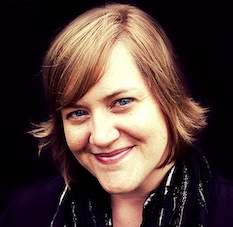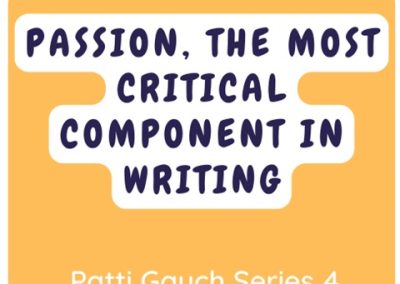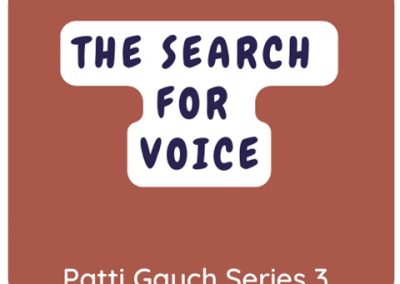Today was the coldest day of the year so far. I guess that’s not too great a feat considering it is only January but it did get me thinking about summer the way only a zero-degree day can.
This summer I’ll be at the Highlights Foundation’s Summer Camp for writers, tucked away in the Pocono Mountains. It’s been awhile since I’ve dedicated an entire week to writing for children. The last time was July of 2008. I packed my bags and headed for Summer Camp under the watchful eye of Mr. Kent Brown. He paired us with our mentors for the week he made sure we had our fill of ice cream and writing opportunities.
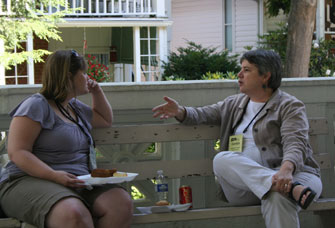
Listening intently to Carolyn Yoder
I was assigned to Carolyn Yoder that week. Sitting across from Carolyn Yoder can be, I want to say intimidating, but that isn’t quite right given her generous nature, exhilarating, maybe? Even though it was early on in my dream of writing for children I had heard stories of Carolyn Yoder the Mentor: “The one that really makes you work.” And at Summer Camp that year I was more than a little anxious to hear what she would say about my quiet little picture book manuscript that followed a little girl and her father through the fair on a crisp September day.
My stomach mimicked my summer footwear and did a complete flip-flop as I watched Carolyn flip from page one to page two without looking up. For a good, long, what-felt-like-years, moment Carolyn flipped then flopped from page one to page two. One. Two. One. Two. Her face sat with little expression then her chin tilted towards me at the last second letting me know she had a verdict. I clicked my pen and readied my notebook for her pearls of wisdom–scratch that–diamonds. It was Carolyn Yoder after all.
“It’s nice,” she said. Then the flipping began again. With a nod of her head she repeated, “nice” again. The word thumping in my head like I’d just been punched with a whack-a-mole mallet.
Nice? Nice? Carolyn Yoder doesn’t just say nice. That’s like in the days when Simon Cowell would lean back in his chair after a performance and just shrug. That’s like when you muster the courage to lay your most precious hopes and dreams on paper and then place them in front of one of the most talented nonfiction editors in the game and she says, “nice” as though she were describing the ply of towels in the cabins nearby. Oh, wait–that was exactly what was happening!
So I wrote: NICE in all capital letters in my notebook under the date and underlined it twice. Then I remembered I was at Summer Camp and I was with a mentor that would “make you work.” I had two other one-on-one sessions with her in the coming days. There had to be more than just “nice.”
Carolyn flipped to page two and wrote on the manuscript (that sits in my office to this day): Why fair? Carnival?
She looked up at me. “Is the girl you?” she asked, immediately followed by, “Tell me more about the fair? This fair?” She pointed to the page.
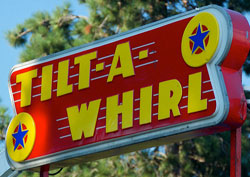
Photo by Sally Lindsay.
And then we talked because that’s the luxury of summer camp. Time. Lunch followed my one-on-one meeting so we grabbed our plates and sat back under a tree and talked. I told her about the fair that I grew up going to the last week of September every year. The one just down the hill from my house. My bedroom window lit up by the tilt-a-whirl lights and the hum of the fool-the-guesser catcalls trickling through my window’s screen like a lullaby each night. And then, almost as though I’d been hit in the head by that same damn whack-a-mole mallet, I remembered more. I told her about the summers I’d spent traveling on a small carnival with my best girlfriends up and down the east coast, small town after small town. Tearing down the show in one spot and building the whole scene back to perfection in just hours in a new town.
I’d worked the pop-a-balloon stand for the first summer when I was just thirteen. Pop a balloon, get a poster. My cheeks hurt at the end of the night but that didn’t keep my girlfriends and I from talking until the first light of morning hit our shared room. Night after night and morning after morning.
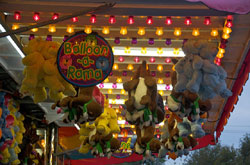
Photo by Sally Lindsay.
They moved me to the fresh-squeezed lemonade stand our second summer, a little shack stacked to the heavens with fresh lemons. My arms grew muscular from all that squeezing. To my surprise, I was good at calling people in and better at selling the extra-large cups. I was even better when my best friend Jessi would join me on nights like the 4th of July, when everybody in the entire fairgrounds wanted fresh-squeezed goodness to sip as they watched fireworks split the sky.
A few summers I ran the cotton candy trailer. I went full-blown artiste mixing colors and filling every square inch of that glass-walled trailer with puffs of spun sugar. And then my last summer with this special family, they finally handed me a headset with my own foam cover for the microphone. I had made it to the top: The Rainbow Color Wheel. Put a dollar down, I’ll spin the wheel, and YOU could win a prize right here.

Photo by Sally Lindsay.
I’d sing along with the ride across the midway from me: The Hurricane. They played classic 80’s rock and I had the microphone, remember. Every so often the guys from the ride would blare Whitney’s version of “I Will Always Love You” and our portion of the midway would fill with folks watching the guys slow dance, hand in hand, along the landing of The Hurricane and listen to my splintered version of the song. I wasn’t good but I was enthusiastic. It always brought people to the game, usually laughing at me, and the wheel would spin into the deep hours of night.
“I want that story,” Carolyn said when I’d finished reminiscing about my carnival glory days. “I want you to write that story,” she said.
She gave me my first assignment: start over.
Make the protagonist older.
Start your novel.
“Novel?”
Me? Write a novel? I taught primary school. I read picture books every day. I studied the picture book form. Me? Write a novel?
Even with my hesitation I remembered that I came to Summer Camp to grow as a writer. To learn the craft of writing from all of the mentors and especially my own. So I wrote, out on the porch, well into the night. Then took workshops and classes the whole next day. I wrote ideas on the margins of class handouts and post-its. That night, a Peter Jacobi keynote still ringing in my heart from after dinner, I wrote again. And then I met with Carolyn the next afternoon for my second one-on-one critique. Unlike the first story, which she had weeks prior to the workshop, this one was cold. Brand new for both her and me. She asked me to read it aloud to her. And after I swallowed the boulder-sized bundle of nerves in my throat I began.
She took the pages from my hand about ten minutes into reading. She went back to the first page and read silently. “I like this,” she said. “How much did you write in his voice?” She fanned the pages.
Nearly fifty pages of a middle grade novel spilled out of me under Carolyn’s direction. “Is it historical?” She asked more to herself than me. “Set in the eighties?”
She gave me more notes, ideas. She underlined descriptions of setting twice that she liked and circled some of the characters. “Are they real?” she asked speaking of characters like Big Al, the show’s owner, and Emilio, the snake handler. I nodded.
“Keep going,” she said. With just two days left of camp and one final meeting with Carolyn I wrote and wrote. When we met for our last time on the last afternoon of camp I handed her the stack of pages that I had printed in the library that morning. She handed them back to me without reading a word.
“I already know you can write.”
Powerful words.
Were other words ever more valuable than those to a writer?
She followed with another question, another Carolyn Yoder question, a question meant to lead me, to make my writing better, the hardest and best kind, “Why him?”
I pursed my lips. The him she was referring to was my protagonist, Charlie. “Isn’t this your story?” she asked. This story was maybe the fifth thing that I wrote as a (gulp) “writer”, a stretch to say the least, the beginning of a NOVEL.
Me?
Writing a novel?
And now it needs to be my story?
Charlie was a good protagonist. He was. His view of the carnival at thirteen was flawed yet hopeful. He had “a journey”. Wasn’t that what Kim Griswell asked me to consider during her session on heroes that week?
The notes I took from Carolyn that day stop at the question: “Isn’t this your story?” I left camp with that question rolling around in my head. I thought of Rich and Sandra Wallace at the front of the classroom that week telling me to mine my memories, and Jerry Spinelli leaning into the microphone during a keynote saying, “Write what you know.”
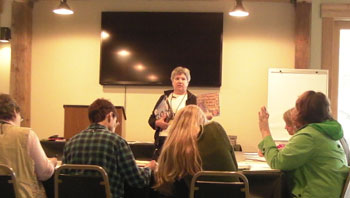
Carolyn Yoder with workshop students.
That week with Carolyn Yoder shaped me as a writer. Her questions and her encouragement sit on my shoulder whenever I sit down to write. The carnival story was my story and it would go through dozens of revisions until I found the version that felt like the end. The story itself became an exercise in finding out what writing comes naturally to me and I wouldn’t have found that place without Carolyn’s guidance.
As a writer I’ve had many creative mentors but the guidance that I received at that Summer Camp, across the picnic table from that editor, will never be replicated. If you are starting out, trying to find your story, trying to figure out who you are as a writer, I recommend Summer Camp with the Highlights Foundation. I know that you too will receive many one-on-one sessions, time to write on your porch, good food, the soothing sound of the creek nearby, and best of all, a mentor that will make you work.




